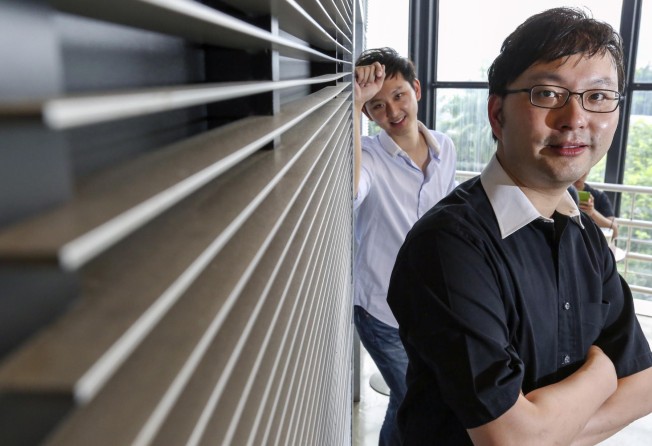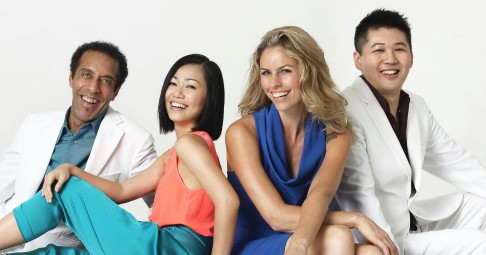The Chung Brothers and Bossa Negra try to change it up in the local music scene
Two music releases look to break the city's commercial pop barrier with multilingual, multicultural tunes, writes Robin Lynam

Hong Kong has always been an internationally minded city, and that fact is increasingly reflected not just in the way local musicians think, but also in the way they record.
Two albums recently released through Universal Music illustrate the point. Edge, which came out on July 26, is the third album by The Chung Brothers, Roger and Henry, who made their debut in 2009 with a "Canto-Gospel" album, The Chimes. Their latest release features an all-star cast of local and international musicians recorded in Hong Kong, Taiwan and Los Angeles.
Bossa Negra, released just before the World Cup began, is a collaboration of various artists, including Asia-based singers and Brazilian based musicians, produced by Hong Kong-born drummer and percussionist Howard Lee and Brazilian bassist Sergio Brandao.
The instrumental parts were recorded in Rio De Janeiro, and the vocals in Hong Kong, Taiwan, Singapore and on the mainland.
Both albums are multilingual, with the Bossa Negra songs performed in Putonghua, Cantonese and English. Lee's concept is to make Brazilian music more accessible to Chinese speakers by matching the rhythms to lyrics they can understand.
The songs on Edge are also performed in those three languages/dialects - plus several more, including Spanish, Hakka and Hindi.
"The whole concept is about 'glocalisation' - people cherishing their own heritage and culture. That's why every artist is singing in their own language, and at the same time talking about being as one in the world," says Roger Chung, who sang, co-wrote and co-produced the album with his brother, harmonica virtuoso Henry.
In producing the album the brothers took advantage of visits to Hong Kong by touring musicians such as Swedish guitarist Ulf Wakenius, Dutch harmonica player Hendrik Meurkens and Hawaiian ukulelist Daniel Ho.

They also travelled to Taiwan to record singer-songwriter Lin Sheng-xiang, who sings in Hakka; and Los Angeles, where they recorded with gospel legend Andraé Crouch.
"There were a couple of tracks which we really wanted to record in the US with the right musicians, because they can provide the sound that we want, so we flew to LA, booked a recording studio for three days, and we got some of the best LA musicians to record rhythm sections for the songs," says Henry Chung. "We had Reggie McBride on bass and Laval Belle on drums, both of whom have played for Keb' Mo'."
The brothers say Crouch is one of their music heroes, so they were ecstatic to have the opportunity to work with him. "He heard our first album and was dumbfounded that there are people doing gospel music in Hong Kong," says Henry Chung.
Seven-time Grammy award winner Crouch and six-time winner Ho, along with Meurkens, Lin, Chinese-Jazz fusion group Sizhukong, Hong Kong singer-songwriter Lowell Lo and local indie artist Lenny Kwok, are among the artists featured on One World, a Bob Marley-inspired song about "glocalisation" that features lyrics in seven languages, and artists from 14 countries.
Other standout tracks include the Bob Dylan-inspired The Anti-Establishment Blues, featuring the voice of "Big Al" Albert Cheung from vintage rock band Jade, along with singer-songwriter Damon Leung Kau; and a new interpretation of the 1987 Danny Summer hit, What Our Future Holds, featuring guest appearances from Summer and guitarist Joey Tang.
"We think that song was prophetic. What Our Future Holds really resonates with the theme of our other original songs," says Roger Chung.
More than 100 musicians were involved in making the album, including leading Hong Kong jazz instrumentalists Eugene Pao, Ted Lo, Blaine Whittaker, Sylvain Gagnon, Cameron Reid and Bob Mocarsky, and string players from the Hong Kong Philharmonic and Sinfonietta.
Edge is a remarkable logistical achievement, as well as a musical one, as is Bossa Negra.
In addition to recording with many of Brazil's top session musicians in Rio de Janeiro, Howard Lee chose to mix the album in Argentina, partly for budgetary reasons, but also to get a "warmer" sound by working on an old-fashioned analogue mixing desk. Australian vocalist Jacqueline Gawler recorded her vocals, for which she wrote the lyrics, in Rio de Janeiro with Lee, but Chinese vocals from Soler and Ginger Kwan were recorded locally.
"I wanted to do something that has never been done," says Lee. "That is when I thought about making an entire album of Brazilian songs sung in English, Cantonese and Mandarin.
"After all, I am Chinese, it has the largest market and it would be cool to get my Chinese compatriots who usually listen to Chinese pop into Brazilian music through this album."
Lee says he considers Bossa Negra "more of a brand than a band, and the branding is to give a mainstream Chinese and English audience an introduction to Brazilian music through collaborations with other well-known singers".
Lee says getting Mandarin lyrics he was happy with written here, or on the mainland, was difficult but settled on collaborators in Taiwan who seemed more in tune with the objectives of the project.
The Chung Brothers write their own Chinese and English lyrics, and, for the other languages featured on the album, found a novel way of collaborating with the featured vocalists.
"We put English lyrics into Google Translator and gave the artists the translations," says Roger Chung. "They adjusted them and put in their own idiom.
Thematically, they are concerned with life in Hong Kong, specifically the challenges of living in the city.
" Edge is a character in Chinese which means two extremes - the bipolar syndrome that Hong Kong is now facing," says Henry Chung.
"Hong Kong is a city at a crossroads. Politically speaking, socially speaking, and also from a cultural perspective, we're facing many challenges - we want to tackle some of problems that Hong Kong is facing."
Both Edge and Bossa Negra are available on iTunes and from Hong Kong's major music stores. After recording costs have been recouped, all profits from Edge will go to charity